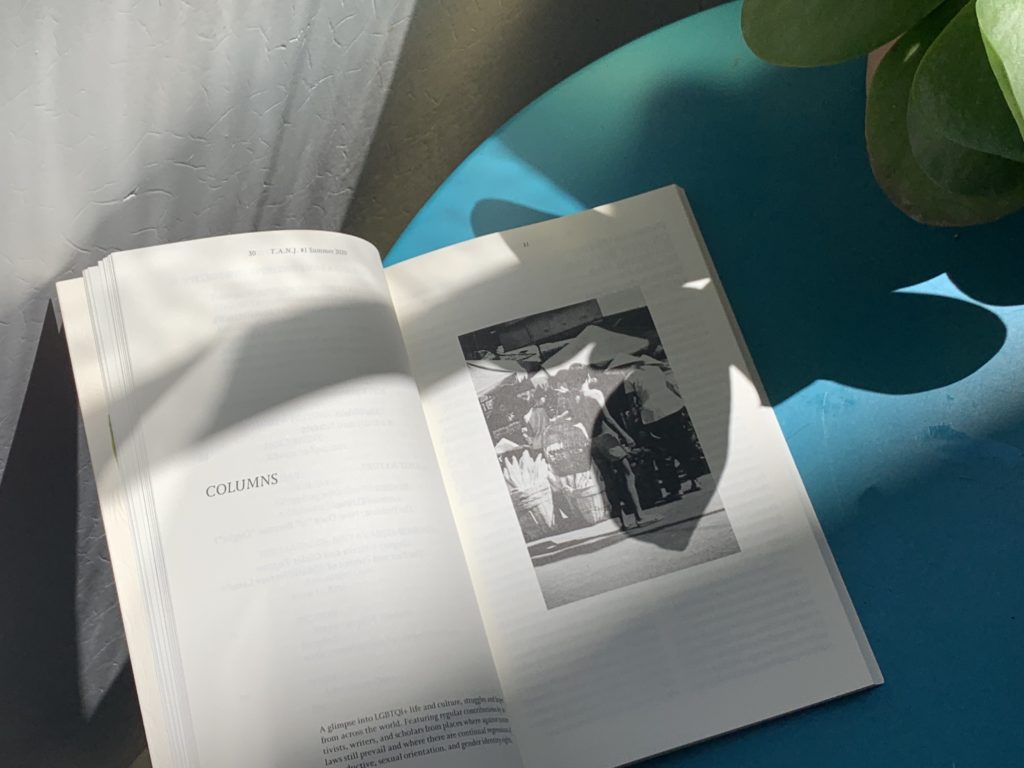The Trial of Kenya’s LGBT Community in the Court of Public Opinion

This text was one of the columns of The Against Nature Journal (T.A.N.J.) issue #1, published by Council in 2020.
As April dovetailed into May 2020, amidst an unprecedented moment in the world, the High Court in Kenya was making its ruling in a petition brought by lmmaker Wanuri Kahiu against the Kenya Film Classification Board (KFCB), the agency responsible for the national regulation of films and broadcast content. In the petition, Kahiu was challenging the KFCB’s decision to ban her lm Ra ki from viewership and distribution within the country. Ra ki, which means “friend” in Kiswahili, tells the coming-of-age story of a romance between two women in Nairobi’s housing estates. Banned in April 2018 for, as the board put it, “its homosexual theme and clear intent to promote lesbianism in Kenya contrary to the law,” the movie went on to premiere at Cannes, making history as Kenya’s first feature at the festival.
Back in Kenya, the lm was greeted with far less celebration. Kenya is one of dozens of countries in Africa that still has jurisdiction to criminalize consensual same- sex sexual activity. With hundreds of annual reported violations and instances of discrimination against sexual and gender minorities, the courts have emerged as a new battleground for activists and opponents in the push for human rights for LGBT people. While Kahiu’s case sought to establish her constitutional right to the freedom of expression, we know that censor- ship of LGBT stories is one way in which discourse can be stymied, limiting the public’s understanding of the challenges that the community faces, prejudicing myths and stereotypes instead. The ruling in April against Kahiu, in favor of upholding the ban, therefore came as a disappointment.
Following the judgment, the director of KFCB, an overzealous moral policeman, who once called for two male lions appearing to have sex in the Maasai Mara to receive counseling, had this to say on Twitter: “We stood for family values and what we believe to be in the best interest of Kenya. Family is the basic unit of society.”
In a country where a reported 80 percent of its 47+ million-strong population identifies as Christian, “family values” has become a dog whistle for conservatism, which in Kenya includes a rejection of homosexuality, fierce admonition of abortion as a woman’s right, and opposition to divorce and single parenthood. But Kahiu’s case is not the first time that Christian values have been conflated with national ones, or for that matter the public’s interest.
Barely a year ago, in another courtroom in the constitutional division of the High Court of Kenya, activists attempting to decriminalize same-sex conduct received another ruling laden with similar appeals. In that ruling, the court had argued that repealing Sections 162 and 165 of the Penal Code, which make same-sex con- duct punishable with up to four- teen years imprisonment, would not only go against national values but threaten the basic unity of the family. Repealing these laws, the judges said, would sanction the coupling and cohabitation of same-sex individuals, posing a challenge to the constitutional definition of marriage as between members of the opposite sex. It was not enough that activists in petitions and oral submissions had argued that this case was not about the right to marry.
Both cases are under appeal and highlight the challenges in seeking redress through the courts, particularly when faced with a fervent religious block that feels mandated by the strength of its numbers to push for a religious state, where a secular one also stands.
Kari Mugo is a Kenyan creative writer, activist, and a regular contributor to various online media outlets where she covers entertainment, culture, global mobility, politics, and travel. Her work has also appeared on radio, podcasts, and on stage and discusses feminism, immigration, and queer identity.
TEXT BY
Kari Mugo
This text was part of The Against Nature Journal (T.A.N.J.) issue #1, published by Council in 2020.
Top image : T.A.N.J #1, Columns, 2020, Council.
T.A.N.J. #1
Articles
Thinking Through Religion
— Aimar Arriola
How to Binj
— Amatesiro Dore
A queer ‘we’?
— Linn Marie Tonstad
Columns
Pride in Jesus Church Service: Bridging the Divide in Barbados and the Caribbean
— Donnya Piggott
Antigender Agendas as Colonial Reestablishments in Brazil and Abya Yala
— Viviane Vergueiro
A Church Coalition’s Rainbow-Inclusion Efforts in India
— Pawan Dhall
The Trial of Kenya’s LGBT Community in the Court of Public Opinion
— Kari Mugo
LGBTQI of the Lebanese Revolution Don’t Need Permission
— Dayna Ash
Of Islamic Laws and the Colonial Past: The Conundrums Faced by the Malaysian LGBT Community
— Niza
Love in the Time of Corona
— Naoufal Bouzid
A Trojan Horse for Warsaw’s Castle
— Eliel Jones
Events
แปร่ง // praeng
– a project by Wirunwan Victoria Pitaktong & Jeanne Penjan Lassus, Bangkok, 2020
Introducing T.A.N.J #1
– online conversation with Vivek Divan, Kari Mugo, Linn Marie Tonstad & the editors